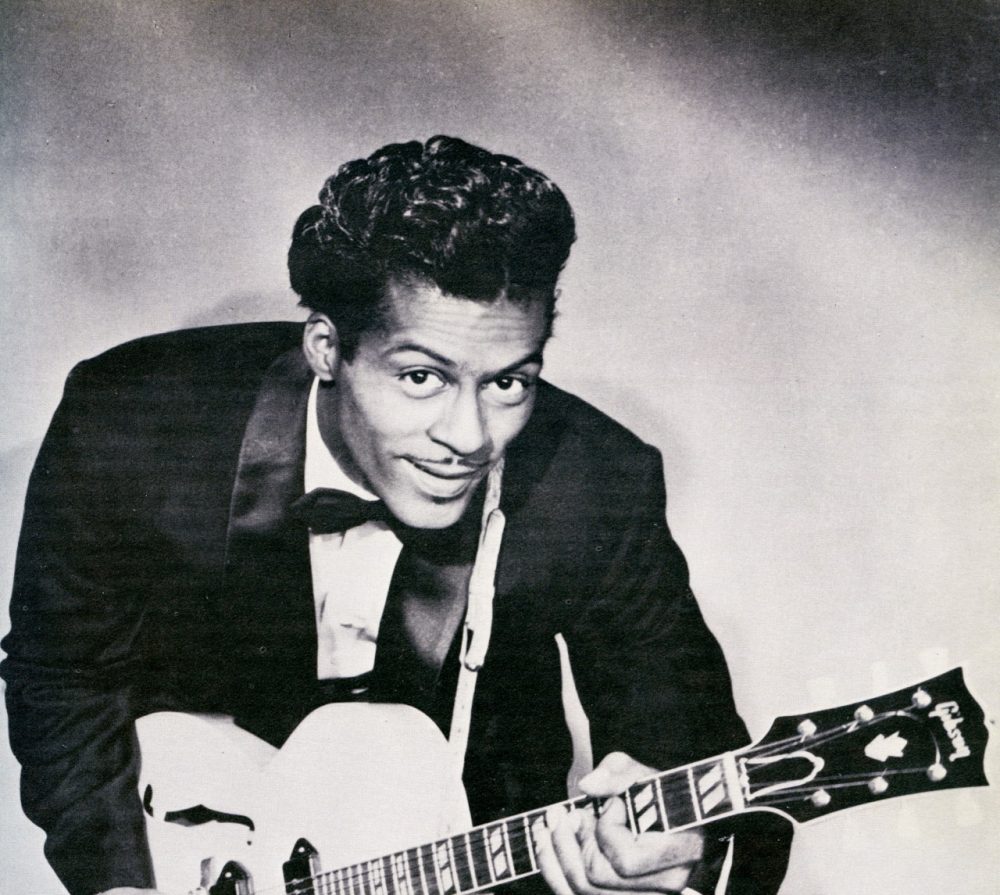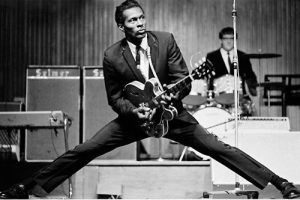
20 Mar Farewell Chuck + Matador Playlist 3/16/17
Welcome back, Gentle Reader(s), to a prematurely spring-like edition of Ye Olde Matador Playliste. Your Humble Narrator will do his best to forego any gnashing of teeth and rending of garments over the latest outrages of Orange Goblinism (save to mention that the mind-boggling insanity continues apace, what with more wire-tapping hallucinations and the unveiling of the Goblin Budget which fulfills everyone’s worst expectations of heartless philistinism) to focus instead upon the passing of one of the true founding fathers of rock and roll—the great Chuck Berry. Yes, the Brown-Eyed Handsome Man hisself has left the building this very day. He was 90 years old and many decades beyond his prime performing and recording years, but nothing will ever diminish the significance and the scope of his innovations and his indelible contributions to the development of rock and roll music. As a guitar player myself, he was more significant to me than Elvis, Jerry Lee Lewis, Fats Domino and Little Richard all rolled into one.
In the epochal Rolling Stone Illustrated History of Rock & Roll, published back in 1976 when Rolling Stone still meant something, Robert Christgau put it this way:
Chuck Berry is the greatest of the rock and rollers… More important, he is the
music’s substance—he taught George Harrison and Keith Richards to play guitar
long before he met either, and his songs are still claimed as encores by everyone
from folkies to heavy metal kids. But Chuck Berry isn’t merely the greatest of the
rock and rollers, or rather, there’s nothing mere about it. Say rather that unless
we can somehow recycle the concept of the great artist so that it supports Chuck
Berry as well as it does Marcel Proust, we might as well trash it altogether.
Chuck Berry was a myth-maker as profound as any in the American cultural lexicon, from Herman Melville to Mark Twain to Lou Reed and on down the line. His best work wasn’t just anthemic, rhythmically propulsive pop music—although it embodied that idiom as completely and perfectly as any before or since—it was an Urtext of the American teen culture that was beginning to emerge in the 1950s. That it was the product of a African American man in his 30s who had served time in reform school, worked on an auto assembly line, and did stints as a hairdresser and cosmetologist before he made it to the pop charts serves to make it all the more remarkable. It was like Berry was channeling archetypes of post-war youth culture before most of its adherents were fully aware that it existed.
Of all Chuck Berry’s creations his most lasting and influential remains Johnny B. Goode. Berry’s poor country boy who could play his guitar just like a ringin’ a bell is rock and roll’s own Huckleberry Finn. Johnny B. Goode was from rural Louisiana but his race is left ambiguous: He might have been a poor white boy like Elvis or a black sharecropper like Muddy Waters. It was part of Berry’s genius that he was able to create tales of teenage angst, yearning and celebration that transcended racial divides even while his audience remained widely segregated outside of the concert hall.
 As a performer, Berry was electrifying in his heyday. He was tall, lanky, dapper and he wore a Gibson hollow body electric guitar with the timelessly stylish panache of a Stetson on the head of John Wayne. For a genuine instrumentalist his stagecraft was wildly physical (Elvis, by comparison, wielded a guitar primarily as a prop) and his signature two-string lead style remains hugely influential to this day. Keith Richards, perhaps more than any other acolyte, took the Berry fretboard technique to heart. Richards has described how Berry’s rhythm playing integrated seamlessly with his lead work, allowing for the guitarist to move out of barre chords to nimble runs on the top two or three strings and back in again without compromising the forward propulsion of the song. There are three cover songs on the Stones’ 1969 live album Get Your Ya Ya’s Out: Robert Johnson’s plaintive Love In Vain and Chuck Berry’s Carol and Little Queenie. Those three songs, along with a dose of Muddy Waters, pretty much encapsulate the DNA of the Rolling Stones. (Richards related the moment in which the Rolling Stones began to come together in his 1971 interview with Robert Greenfield, describing running into Mick Jagger on a train after not having seen him for years: ” ‘Hi, man,’ I say. ‘Where ya going?’ he says. And under his arm he’s got Chuck Berry and Little Walter, Muddy Waters. ‘You’re into Chuck Berry, man, really?’ That’s a coincidence.”)
As a performer, Berry was electrifying in his heyday. He was tall, lanky, dapper and he wore a Gibson hollow body electric guitar with the timelessly stylish panache of a Stetson on the head of John Wayne. For a genuine instrumentalist his stagecraft was wildly physical (Elvis, by comparison, wielded a guitar primarily as a prop) and his signature two-string lead style remains hugely influential to this day. Keith Richards, perhaps more than any other acolyte, took the Berry fretboard technique to heart. Richards has described how Berry’s rhythm playing integrated seamlessly with his lead work, allowing for the guitarist to move out of barre chords to nimble runs on the top two or three strings and back in again without compromising the forward propulsion of the song. There are three cover songs on the Stones’ 1969 live album Get Your Ya Ya’s Out: Robert Johnson’s plaintive Love In Vain and Chuck Berry’s Carol and Little Queenie. Those three songs, along with a dose of Muddy Waters, pretty much encapsulate the DNA of the Rolling Stones. (Richards related the moment in which the Rolling Stones began to come together in his 1971 interview with Robert Greenfield, describing running into Mick Jagger on a train after not having seen him for years: ” ‘Hi, man,’ I say. ‘Where ya going?’ he says. And under his arm he’s got Chuck Berry and Little Walter, Muddy Waters. ‘You’re into Chuck Berry, man, really?’ That’s a coincidence.”)
By the time Chuck Berry moved into the yachting cap phase of his career he had been a nostalgia act for at least two decades. He was a mercurial sort—moody, intensely private, and with a quick temper (he once famously punched Keith Richards in the face for touching his guitar without permission). He traveled the country alone with his Gibson ES 335, playing gigs with pickup bands of highly variable competence. But he was still Chuck Berry—a certified living legend, inducted into the Rock & Roll Hall of Fame in its first draft year. The man left his mark and long as people continue to strap on electric guitars and play rock and roll music Chuck Berry will be there, whether the strappers and players still realize it or not. Well done, Chuck—Marcel Proust has not been forgotten and neither will you.
And now for a Matador Playlist. See ya soon.
Grammar of Life – Charles Bukowski
Pretty Little Thing – the Deepest Blue
Don’t Stop Honey (feat. Mr. Cedric Burnside) – R.L. Burnside
Egg Raid on Mojo – Beastie Boys
Last Time Around – the Del-Vetts
The Unheard Music – X
Dear Prudence – the Beatles
Scarecrow – Pink Floyd (you have to imagine the music for this one)
Bulldog – the Fireballs
Leopardman at C&A – the Dirtbombs
Kooks – David Bowie
Jump, Jive an’ Wail – Louis Prima
Salute Your Solution – the Raconteurs
I Washed My Hands in Muddy Water – Charlie Rich
When I Fall – Sam Phillips
All Day Day Light – the Morning Benders
You’re No Rock n Roll Fun – Sleater Kinney
I’m Alive – Tommy James & the Shondels
Nobody Really Cares if You Don’t Go to the Party – Courtney Barnett
I’ve Always Been Crazy – Waylon Jennings
Sacred Trickster – Sonic Youth
Dancing Barefoot – Patti Smith
No Hassle Night – the Dead Weather
Teenage Head – the Flaming Groovies
Dream Baby (How Long Must I Dream) – Roy Orbison
Pablo Picasso – the Modern Lovers
Machine Gun Blues – Social Distortion
Walkin’ After Midnight – Patsy Cline
Endless Sleeper – the Raveonettes
God Only Knows – David Bowie
Ballad of a Teenage Queen – Johnny Cash
Gold Lion (Diplo Mix) – Yeah Yeah Yeahs
All Day and All of the Night – the Kinks
I Saw the Light – Todd Rundgren
Space – M.I.A.
Pain In My Heart – Three Bad Jacks
All the Young Dudes – Mott the Hoople
Walking the Floor Over You – Ernest Tubb
Train Kept A Rollin’ – the Yardbirds
Think (About It) – Lyn Collins
If I Can’t Change Your Mind – Sugar
(Keep Feeling) Fascination – the Human League
Tupelo – Nick Cave & the Bad Seeds
Why Can’t I Touch It? – the Buzzcocks
We the People… – A Tribe Called Quest
Girl of My Dreams – Bram Tchaikovsky
Tramp – Otis Redding & Carla Thomas
Stop Me If You’ve Heard This One Before – the Smiths
Bye Bye Love – the Everly Brothers
Get Up Offa That Thing – James Brown
It’s the End of the World As We Know It – R.E.M.
Can It Be – the Savoys
Funnel of Love (feat. Madeline Follin) – SQÜRL
Seasick – Silversun Pickups
Nowadays People – Captain Crunch & the Crew
What We All Want – Gang of Four
Just Like Honey – Jesus & Mary Chain
World Without Tears – Lucinda Williams
Buona Sera – Louis Prima
Happy Trails – Roy Rogers & Dale Evans (feat. Trigger on Hollowbody Electric Guitar)
Taxi – Bryan Ferry
